五种基本句型
英语五种基本句型
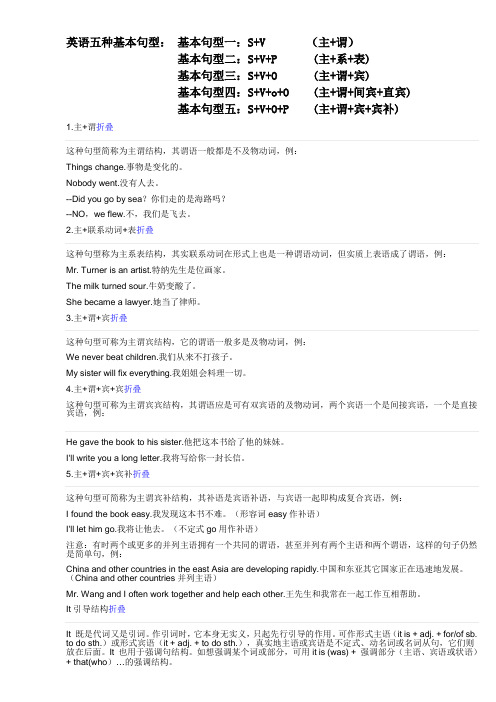
英语五种基本句型:基本句型一:S+V (主+谓)基本句型二:S+V+P (主+系+表)基本句型三:S+V+O (主+谓+宾)基本句型四:S+V+o+O (主+谓+间宾+直宾)基本句型五:S+V+O+P (主+谓+宾+宾补)这种句型简称为主谓结构,其谓语一般都是不及物动词,例:Things change.事物是变化的。
Nobody went.没有人去。
--Did you go by sea?你们走的是海路吗?--NO,we flew.不,我们是飞去。
这种句型称为主系表结构,其实联系动词在形式上也是一种谓语动词,但实质上表语成了谓语,例:Mr. Turner is an artist.特纳先生是位画家。
The milk turned sour.牛奶变酸了。
She became a lawyer.她当了律师。
这种句型可称为主谓宾结构,它的谓语一般多是及物动词,例:We never beat children.我们从来不打孩子。
My sister will fix everything.我姐姐会料理一切。
4.主+谓+宾+宾折叠这种句型可称为主谓宾宾结构,其谓语应是可有双宾语的及物动词,两个宾语一个是间接宾语,一个是直接宾语,例:He gave the book to his sister.他把这本书给了他的妹妹。
I'll write you a long letter.我将写给你一封长信。
这种句型可简称为主谓宾补结构,其补语是宾语补语,与宾语一起即构成复合宾语,例:I found the book easy.我发现这本书不难。
(形容词easy作补语)I'll let him go.我将让他去。
(不定式go用作补语)注意:有时两个或更多的并列主语拥有一个共同的谓语,甚至并列有两个主语和两个谓语,这样的句子仍然是简单句,例:China and other countries in the east Asia are developing rapidly.中国和东亚其它国家正在迅速地发展。
五种基本句型(含练习及答案)

报的一位记者作有关东欧目前局势的重要报告。
翻译:我们发现大礼堂坐满了学生和教师,在听人民日报的 一位同志作有关东欧目前局势的重要报告。
???分析结构: 我们 发现(谓语) 大 礼堂 full of 学生和老师(复数) who 在听(谓语)重要 报告 made by 一位同志 from 人民日报 about 目前局势 in 东欧。
SV 2.My grandma is sleeping now. 3.I will stay in Shanghai for a week.
4.Lucy arrived in Beijing yesterday
基本句型 二
S +V +O(主+谓+宾)
特点:谓语动词都是实义动词,但不能表达 完整的意思,必须跟宾语,即动作的承受者, 才能使意思完整。这类动词叫做及物动词。
▪ leave(留给某人……), leave sb sth (leave sth to sb)
▪ pass(递给某人……), pass sb sth (pass sth to sb)
▪ read(给某人读……), read sb sth (read sth to sb)
▪ write(给某人写……), write sb sth (write sth to sb)
▪ pay(支付给某人……), pay sb sth (pay sth for sb)
▪ buy(为某人买……), buy sb sth (buy sth for sb)
▪ do(为某人做……) do sb sth (do sth for sb)
▪ sing(为某人唱……) sing sb sth (sing sth for sb)
英语五种基本句型

Exercise
1. He is studying. 主语 谓语 2. The teachers love us. 主语 谓语 宾语 3. You showed us your photos. 主语 谓语 间宾 直宾 will ask me to jump. 4. Tom will ask me to jump. 主语 谓语 宾语 宾补 5. They can sing well. 主语 谓语 状语
英 语 五 种 基 本 句 型
1. 主语 + 系动词 + 表语 2. 主语 + 谓语 3. 主语 + 谓语 + 宾语 4. 主语 + 谓语 + 间宾 + 直宾 5. 主语 + 谓语 + 宾语 + 宾补
五种基本句型
1. 主语 系动词 表语 (SVC) 主语+系动词 表语: 系动词+表语
He is a student. His face turned red. The apple tastes sweet. The soldier keeps still.
分 析 句 子 结 构
1. His father is a good cook.
主系表
2. She is watering the flowers. 主谓宾 3. You can sing and dance. 主谓 4. We will buy him a book. 5. These books are good. 6. Jack wants me to dance. 7. She has an old car. 8. It’s my duty to help you. 主谓双宾 主系表 主谓宾宾 主谓宾 主系表
英语五种基本句型
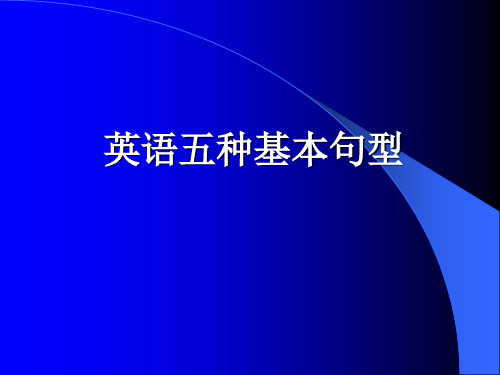
for sb)
cook(为某人煮……) cook sb sth (cook sth for sb)
choose(为某人选择……) choose sb sth (choose sth for sb)
make(为某人做……) make sb sth (make sth for sb)
pay(支付给某人……), pay sb sth (pay sth for sb)
buy(为某人买……), buy sb sth (buy sth for sb)
do(为某人做……) do sb sth (do sth for sb) sing(为某人唱……) sing sb sth (sing sth
主语 + 及物动词 + 间接宾语(人) + 直接宾语(物)
1. His father bought him a computer. 2. I sent a birthday gift to her yesterday. 3. My mother taught me how to do it 4. She asked Lucy whose pen it was.
Lucy will make herself known.
I want the work finished soon.
IV. 接现在分词作宾语补足语 的动词常见的有watch, see, hear, find, keep等。如:
birds singing.
I saw the little girl dancing.
V. 接介词短语作宾语补足语的 动词常见的有find, keep, take,consider,等。如:
英语五种基本句型
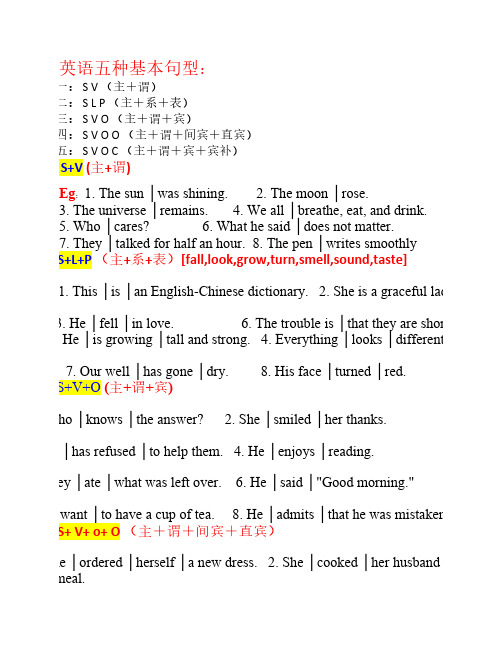
英语五种基本句型:基本句型一: S V (主+谓)基本句型二: S L P (主+系+表)基本句型三: S V O (主+谓+宾)基本句型四: S V O O (主+谓+间宾+直宾)基本句型五: S V O C (主+谓+宾+宾补)句型一: S+V (主+谓)Eg:1. The sun │was shining. 2. The moon │rose.3. The universe │remains.4. We all │breathe, eat, and drink.5. Who │cares?6. What he said │does not matter.7. They │talked for half an hour. 8. The pen │writes smoothly句型二:S+L+P (主+系+表)[fall,look,grow,turn,smell,sound,taste]1. This │is │an English-Chinese dictionary.2. She is a graceful lady.3. He │fell │in love. 6. The trouble is │that they are short of money5. He │is growing │tall and strong. 4. Everything │looks │different.7. Our well │has gone │dry. 8. His face │turned │red.句型三:S+V+O (主+谓+宾)1. Who │knows │the answer?2. She │smiled │her thanks.3. He │has refused │to help them.4. He │enjoys │reading.5. They │ate │what was left over.6. He │said │"Good morning."7. I │want │to have a cup of tea. 8. He │admits │that he was mistaken.句型四:S+ V+ o+ O (主+谓+间宾+直宾)1. She │ordered │herself │a new dress.2. She │cooked │her husband │a delicious meal.3. He │brought │you │a dictionary.4. He │denies │her│nothing.5. I │showed │him │my pictures.6. I │gave │my car │awash.7. I │told │him │that the bus was late. 8. He │showed │me│how to run the machine.句型五:S V O C (主+谓+宾+宾补)Eg: 1. They │appointed │him │manager. 2. They │painted│the door │green.3. This │set │them │thinking.4. They │found │the house│deserted.5. What │makes │him │think so?6. We │saw │him │out.7. He │asked │me │to come back soon. 8. I │saw │them│getting on the bus.:句型(一)主语+不及物动词 ( S + V ) :1. 他昨天早上起床很晚。
英语五种简单句基本句型

英语五种简单句基本句型英语五种简单句基本句型一.五种简单句基本句型1.“主语+谓语”(即“主谓”句型)这一句型英汉语言结构形式完全相同,说明“某人或某物如何动作”,或者说“某人或某物自身怎样运动”。
例:TheyarrivedinHarbinyesterdaymorning.分析:“they”(主语)“arrived”(谓语)。
2.“主语+谓语+宾语”(即“主谓宾”句型)这一句型英汉语言的结构形式完全相同,用以说明“某人或某物做什么事情”,或者说“某人或某物发出了动作,并且其动作涉及到另一个人或物”。
例:IstudyEnglish.分析:“I”(主语)“study”(谓语动作)“English”(宾语即动作涉及的对象)。
3.“主语+谓语+间接宾语+直接宾语”(即“主谓双宾”句型)这一句型英汉语序结构相同,说明“某人为谁(间接宾语为人)做某事”,或者说“某人或物的运动涉及到两个对象,其中一个间接对象为人,另一个为物”。
例:OurteachertaughtusEnglish.分析:“ourteacher”(主语)“教”(谓语动作)“us”(间接宾语)“English”(直接宾语)。
4.“主语+谓语+宾语+宾语补足语”(即“主谓宾宾补”句型)这一句型说明“某人或某物要求(使、让)某人做什么”或“某人感觉某人或物怎么样”。
例:Heaskedhertogothere.分析:“he”(主语)“asked”(谓语动作)“her”(宾语即动作涉及的对象)“togothere”(补语--补充说明宾语做什么)。
5.“主语+系动词+表语”(即“主系表”句型)这一句型用以说明“某人(某物、某事、某种概念)具有什么特征或处于什么状态”。
汉语的“是”字结构属于这一英语句型的形式之一。
常用的系动词有be,keep,lie,remain,stand,become,fall,get,go,grow,turn,look,feel,see m,smell,sound,taste,等。
五种基本句型
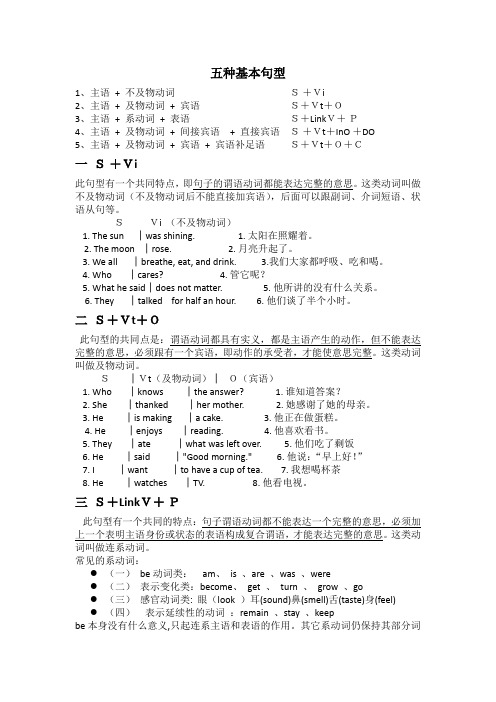
五种基本句型1、主语+ 不及物动词S+Vi2、主语+ 及物动词+ 宾语S+Vt+O3、主语+ 系动词+ 表语S+LinkV+P4、主语+ 及物动词+ 间接宾语+ 直接宾语S+Vt+InO +DO5、主语+ 及物动词+ 宾语+ 宾语补足语S+Vt+O+C一S+Vi此句型有一个共同特点,即句子的谓语动词都能表达完整的意思。
这类动词叫做不及物动词(不及物动词后不能直接加宾语),后面可以跟副词、介词短语、状语从句等。
SVi (不及物动词)1. The sun │was shining. 1. 太阳在照耀着。
2. The moon │rose. 2. 月亮升起了。
3. We all │breathe, eat, and drink. 3.我们大家都呼吸、吃和喝。
4. Who │cares? 4. 管它呢?5. What he said│does not matter. 5. 他所讲的没有什么关系。
6. They │talked for half an hour. 6. 他们谈了半个小时。
二S+Vt+O此句型的共同点是:谓语动词都具有实义,都是主语产生的动作,但不能表达完整的意思,必须跟有一个宾语,即动作的承受者,才能使意思完整。
这类动词叫做及物动词。
S│Vt(及物动词)│O(宾语)1. Who │knows │the answer? 1. 谁知道答案?2. She │thanked │her mother. 2. 她感谢了她的母亲。
3. He │is making │a cake. 3. 他正在做蛋糕。
4. He │enjoys │reading. 4. 他喜欢看书。
5. They │ate │what was left over. 5. 他们吃了剩饭6. He │said │"Good morning." 6. 他说:“早上好!”7. I │want │to have a cup of tea. 7. 我想喝杯茶8. He │watches │TV. 8. 他看电视。
英语五种基本句型

10. I’m looking forward to meeting you soon.
基本句型四: 主+谓(及物)+双宾(间 宾+直宾)
此句型的句子有一个共同特点:谓语动词 必须跟有两个宾语才能表达完整的意思. 这两个宾语一个是动作的直接承受者,另 一个是动作的间接承受者.通常这一间接 承受者用一个介词来连接,当动作的间接 承受者在动作的直接承受者之前时,这一 介词往往被省略.
英语五种基本句型
基本句型一: 主+系+表
此句型的句子有一个共同的特点:句子谓语动词 都不能表达一个完整的意思,必须加上一个表明 主语身份或状态的表语构成复合谓语,才能表达 完整的意思.这类动词叫做连系动词.系动词分 两类:be, look, keep, seem等属一类;get, grow, become, turn等属另一类,表示变化.be 本身没有什么意义,只起连系主语和表语的作用. 其它系动词仍保持其部分词义.
8. It is getting darker and darker.
9. 这食物吃起来挺可口的。 9. The food tastes delicious. 10. 这故事听起来很有趣。 10. The story sounds very interesting.
基本句型二: 主+谓(不及物动词)
2. 我们正在使我们的国家变得越来越美丽。
2. We are making our country more and more beautiful.
3. 当我到达教室时,我发现里边没有人。
3. When I got to the classroom, I found nobody in.
英语中五大基本句型是什么
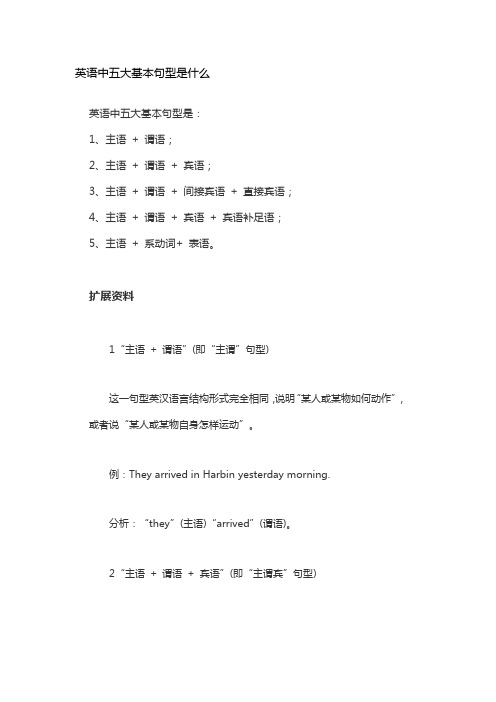
英语中五大基本句型是什么英语中五大基本句型是:1、主语+ 谓语;2、主语+ 谓语+ 宾语;3、主语+ 谓语+ 间接宾语+ 直接宾语;4、主语+ 谓语+ 宾语+ 宾语补足语;5、主语+ 系动词+ 表语。
扩展资料1“主语+ 谓语”(即“主谓”句型)这一句型英汉语言结构形式完全相同,说明“某人或某物如何动作”,或者说“某人或某物自身怎样运动”。
例:They arrived in Harbin yesterday morning.分析:“they”(主语)“arrived”(谓语)。
2“主语+ 谓语+ 宾语”(即“主谓宾”句型)这一句型英汉语言的结构形式完全相同,用以说明“某人或某物做什么事情”,或者说“某人或某物发出了动作,并且其动作涉及到另一个人或物”。
例:I study English.分析:“I”(主语)“study”(谓语动作)“English”(宾语即动作涉及的'对象)。
3“主语+ 谓语+ 间接宾语+ 直接宾语”(即“主谓双宾”句型)这一句型英汉语序结构相同,说明“某人为谁(间接宾语为人)做某事”,或者说“某人或物的运动涉及到两个对象,其中一个间接对象为人,另一个为物”。
例:Our teacher taught us English.分析:“our teacher”(主语)“教”(谓语动作)“us”(间接宾语)“English”(直接宾语)。
4“主语+ 谓语+ 宾语+ 宾语补足语”(即“主谓宾补”句型)这一句型说明“某人或某物要求(使、让)某人做什么”或“某人感觉某人或物怎么样”。
例:He asked her to go there.分析:“he”(主语)“asked”(谓语动作)“her”(宾语即动作涉及的对象)“to go there”(补语—补充说明宾语做什么)。
5“主语+ 系动词+ 表语”(即“主系表”句型)这一句型用以说明“某人(某物、某事、某种概念)具有什么特征或处于什么状态”。
英语五种基本句型

基本句型五: 主+谓(及物)+复合宾语 (宾+宾补)
此句型的句子的共同特点是:动词虽然是及物 动词,但是只跟一个宾语还不能表达完整的意思, 必须加上一个补充成分来补足宾语,才能使意思 完整. 1. They │painted │the door │green. 他 们把门漆成绿色. 2. They │found │the house │deserted. 他们发现那房子无人居住.
8. It is getting darker and darker.
9. 这食物吃起来挺可口的。 9. The food tastes delicious.
10. 这故事听起来很有趣。
10. The story sounds very interesting.
基本句型二: 主+谓(不及物动词)
基本句型三: 主+谓(及物)+宾
1. 去年在学校电脑竞赛中我获得了一等奖。 1. Last year I won first prize in the school computer competition. 2. 在业余时间我喜欢听流行音乐和收集邮票。 2. In my spare time I enjoy listening to popular music and collecting stamps. 3.几天前我和我兄弟骑自行车去看电影。 3. The other day my brother and I went to the cinema by bicycle.
基本句型四: 主+谓(及物)+双宾(间 宾+直宾)
此句型的句子有一个共同特点:谓语动词 必须跟有两个宾语才能表达完整的意思. 这两个宾语一个是动作的直接承受者,另 一个是动作的间接承受者.通常这一间接 承受者用一个介词来连接,当动作的间接 承受者在动作的直接承受者之前时,这一 介词往往被省略.
五种基本句型
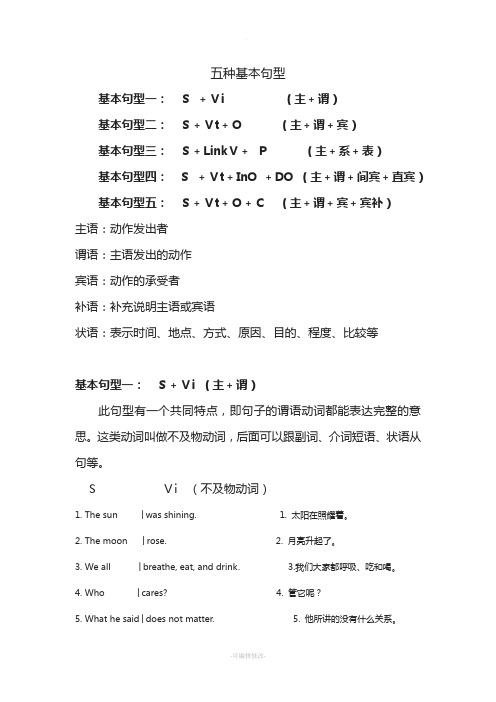
五种基本句型基本句型一:S+Vi (主+谓)基本句型二:S+Vt+O(主+谓+宾)基本句型三:S+LinkV+P(主+系+表)基本句型四:S+Vt+InO +DO (主+谓+间宾+直宾)基本句型五:S+Vt+O+C(主+谓+宾+宾补)主语:动作发出者谓语:主语发出的动作宾语:动作的承受者补语:补充说明主语或宾语状语:表示时间、地点、方式、原因、目的、程度、比较等基本句型一:S+Vi (主+谓)此句型有一个共同特点,即句子的谓语动词都能表达完整的意思。
这类动词叫做不及物动词,后面可以跟副词、介词短语、状语从句等。
SVi (不及物动词)1. The sun │was shining. 1. 太阳在照耀着。
2. The moon │rose. 2. 月亮升起了。
3. We all │breathe, eat, and drink. 3.我们大家都呼吸、吃和喝。
4. Who │cares? 4. 管它呢?5. What he said│does not matter. 5. 他所讲的没有什么关系。
6. They │talked for half an hour. 6. 他们谈了半个小时。
基本句型二S+Vt+O(主+谓+宾)此句型的共同点是:谓语动词都具有实义,都是主语产生的动作,但不能表达完整的意思,必须跟有一个宾语,即动作的承受者,才能使意思完整。
这类动词叫做及物动词。
S│Vt(及物动词)│O(宾语)1. Who │knows │the answer? 1. 谁知道答案?2. She │thanked │her mother. 2. 她感谢了她的母亲。
3. He │is making │a cake. 3. 他正在做蛋糕。
4. He │enjoys │reading. 4. 他喜欢看书。
5. They │ate │what was left over. 5. 他们吃了剩饭6. He │said │"Good morning." 6. 他说:“早上好!”7. I │want │to have a cup of tea. 7. 我想喝杯茶8. He │watches │TV. 8. 他看电视。
五种简单句的基本句型

五种简单句的基本句型
一、陈述句:
陈述句又叫肯定句,是表示事实、观点、心情等客观状况、真实状态或认可什么别人的观点、表明信念、目的、条件等抽象状态的句子。
陈述句中,动词用现在时态,一般构成要素有主语、谓语、表语三部分,它的句型是:主语+谓语+表语。
如:John is a student.(约翰是一名学生)
二、祈使句:
祈使句又叫命令句,是表示请求、劝告、警告等的句子。
祈使句通常用虚拟语气,动词用现在时态,句式比较简单,一般由主语和谓语组成。
如:Please give me a hand.(请帮忙)
三、一般疑问句:
一般疑问句又叫间接疑问句,是陈述句前提出提问,期待对方回答的句子。
它通常用虚拟语气,动词用现在时态,一般由疑问代词(特殊疑问词)或疑问副词开始,主语和谓语有把握地反转组成。
如:Are you studying English?(你在学习英语吗?)
特殊疑问句又叫直接疑问句,是直接问及某一句子里的主语、谓语、宾语、定语、状语等成分的提问句。
特殊疑问句使用特殊疑问词决定要问的是哪一个句子成分,而且它的谓语可以用一般疑问的形式,一般由疑问代词或疑问副词开头,不用句子反转。
五、感叹句:
感叹句是用来表达感情上的激情,表示对某种情况的惊叹、吃惊、害怕、欢喜、惊奇等。
感叹句一般句型是主语 + 助动词 + 谓语,句中常常有表感叹的词,如:what, how, so 等,此种句型经常采用句子反转的结构。
如:How beautiful the flowers are!(这花多美呀!)。
英语五种基本句型

英语中的五种基本句型
1.SVO句型(主语+动词+宾语):
这是英语中最基本的句型。
在SVO句型中,主语是句子的主要组成部分,它是动作的执行者或者是描述的主体;动词是表示动作或状态的词;宾语则是动作的对象或状态的描述。
例如,“She ate an apple.”(她吃了一个苹果。
)
2.SVC句型(主语+系动词+表语):
在SVC句型中,系动词连接主语和表语,表达主语的状态或特征。
例如,“He is a teacher.”(他是一名教师。
)
3.SVOO句型(主语+动词+间接宾语+直接宾语):SVOO句型包含两个宾语,直接宾语是动作的对象,而间接宾语是接受该对象的人或物。
例如,“He gave me a book.”(他给了我一本书。
)
4.SVOC句型(主语+动词+宾语+表语):
SVOC句型也包含表语,宾语成为了表语所描述的状态或特征。
例如,“They made him the captain.”(他们
让他成为队长。
)
5.SVOA句型(主语+动词+宾语+宾语补足语):
宾语补足语通常是形容词或名词,用来描述或解释宾语。
例如,“We elected him president.”(我们选举他为总统。
)。
五种基本句型
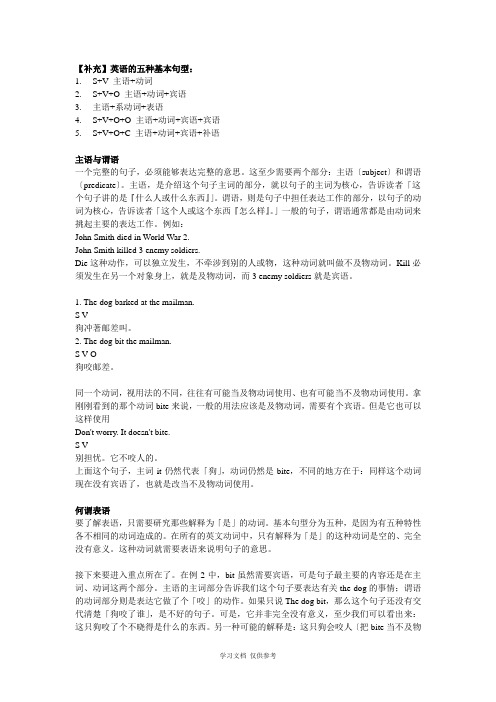
【补充】英语的五种基本句型:1. S+V 主语+动词2. S+V+O 主语+动词+宾语3. 主语+系动词+表语4. S+V+O+O 主语+动词+宾语+宾语5. S+V+O+C 主语+动词+宾语+补语主语与谓语一个完整的句子,必须能够表达完整的意思。
这至少需要两个部分:主语〔subject〕和谓语〔predicate〕。
主语,是介绍这个句子主词的部分,就以句子的主词为核心,告诉读者「这个句子讲的是『什么人或什么东西』」。
谓语,则是句子中担任表达工作的部分,以句子的动词为核心,告诉读者「这个人或这个东西『怎么样』。
」一般的句子,谓语通常都是由动词来挑起主要的表达工作。
例如:John Smith died in World War 2.John Smith killed 3 enemy soldiers.Die这种动作,可以独立发生,不牵涉到别的人或物,这种动词就叫做不及物动词。
Kill必须发生在另一个对象身上,就是及物动词,而3 enemy soldiers就是宾语。
1. The dog barked at the mailman.S V狗冲著邮差叫。
2. The dog bit the mailman.S V O狗咬邮差。
同一个动词,视用法的不同,往往有可能当及物动词使用、也有可能当不及物动词使用。
拿刚刚看到的那个动词bite来说,一般的用法应该是及物动词,需要有个宾语。
但是它也可以这样使用Don't worry. It doesn't bite.S V别担忧。
它不咬人的。
上面这个句子,主词it仍然代表「狗」,动词仍然是bite,不同的地方在于:同样这个动词现在没有宾语了,也就是改当不及物动词使用。
何谓表语要了解表语,只需要研究那些解释为「是」的动词。
基本句型分为五种,是因为有五种特性各不相同的动词造成的。
在所有的英文动词中,只有解释为「是」的这种动词是空的、完全没有意义。
这种动词就需要表语来说明句子的意思。
简单的五种基本句型
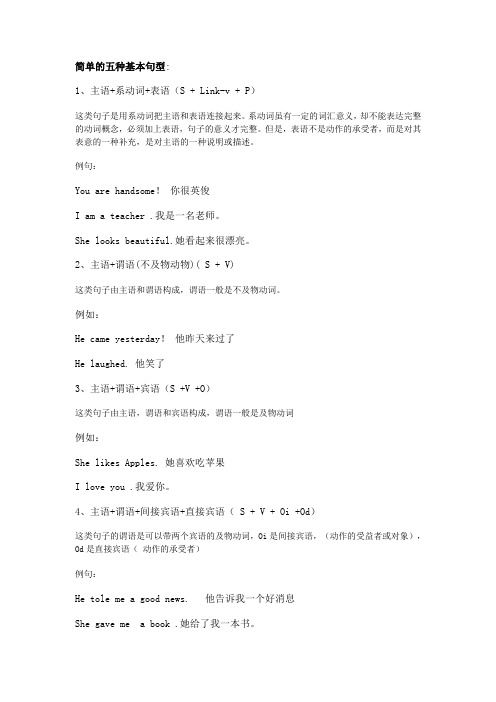
简单的五种基本句型:1、主语+系动词+表语(S + Link-v + P)这类句子是用系动词把主语和表语连接起来。
系动词虽有一定的词汇意义,却不能表达完整的动词概念,必须加上表语,句子的意义才完整。
但是,表语不是动作的承受者,而是对其表意的一种补充,是对主语的一种说明或描述。
例句:You are handsome!你很英俊I am a teacher .我是一名老师。
She looks beautiful.她看起来很漂亮。
2、主语+谓语(不及物动物)( S + V)这类句子由主语和谓语构成,谓语一般是不及物动词。
例如:He came yesterday!他昨天来过了He laughed. 他笑了3、主语+谓语+宾语(S +V +O)这类句子由主语,谓语和宾语构成,谓语一般是及物动词例如:She likes Apples. 她喜欢吃苹果I love you .我爱你。
4、主语+谓语+间接宾语+直接宾语( S + V + Oi +Od)这类句子的谓语是可以带两个宾语的及物动词,Oi是间接宾语,(动作的受益者或对象),Od是直接宾语(动作的承受者)例句:He tole me a good news. 他告诉我一个好消息She gave me a book .她给了我一本书。
I’ll send you a postcard.我将寄一张贺卡给你5、主语+谓语+宾语+宾语补足语( S +V + O + C )这类句子的及物动词不仅要带上一个宾语,还要加上一个宾语补足语意思才完整。
宾语是补充说明宾语的意义,状态等。
例句:They don't have any time to go. 他们没有时间去He painted the bookshelf pink.他把书架漆成了粉色。
1 句子的成分组成句子的各个部分叫做句子的成分。
句子成分包括:主语、谓语、表语、宾语(直接宾语、间接宾语)、宾语补足语、定语和状语。
- 1、下载文档前请自行甄别文档内容的完整性,平台不提供额外的编辑、内容补充、找答案等附加服务。
- 2、"仅部分预览"的文档,不可在线预览部分如存在完整性等问题,可反馈申请退款(可完整预览的文档不适用该条件!)。
- 3、如文档侵犯您的权益,请联系客服反馈,我们会尽快为您处理(人工客服工作时间:9:00-18:30)。
• 定语:用来修饰名词或代词。做定语的除了形 容词外,还有代词、数词、名词、介词短语或 相当于形容词的词或短语来充当。
• For example:
• • • • •
1.Peel three bananas. 2.What is your name? 3.She is a good basketball player. 4.What a beautiful Chinese painting. 5.The teacher asked me a question too difficult to answer.
3.主语+动词+宾语(SVO) 该句中的动词是及物动词,必须有 自己的宾语,否则会视为句子不完 整。
• • • • • 1.He has a sister. 2.They wanted to have a rest. 3.He put the dictionary in the backpack. 4.She stopped teaching English two years ago. 5.They haven’t decided when and where to hold the meeting.
• 宾语补足语:用来补足宾语意义,一般放在宾 语之后,可以充当宾补的有:形容词、副词、 名词、动名词、介词短语、不定式、V-ing形 式和V-ed形式。
• For example:
• • • • •
I found the book very interesting. My mother wants me to drink it. She kept the door open. They named their daughter Mary. They invited me to speak at the meeting.
• 宾语:表示动作、行为的对象,由名词、代词 或相当于名词的词或短语来充当,与及物动词 一起说明主语在做什么。
• For example:
• • • • •
1.He is playing soccer. 2.Can I ask some question? 3.We elected him our monitor. 4.I wrote a letter yesterday. 5.They have carried out the plan successfully.
2.谓语: 说明主语“做什么,是什么或怎么做”,一 般由动词或动词词组来充当。需要注意动词的时态和 语态。主语和谓语在“人称”和“数”两方面必须一 致。
• For example:
• • • •
1.He has a toothache. 2.His parents teach math. 3.I wrote a letter yesterday. 4.He has read the book many times.
5.主语+动词+宾语+宾补(svoc)
该句型概括了这样一种情况:有些及物动词的后面 有时带复合宾语结构(即宾语+宾补),常带复合结 构的及物动词有: elect,feel,find,get,have,hear,imagine,keep,make,n otice,see,let,smell,start,watch,apponit,,believe,call, allow,ask ,cause,consider,expect,know,tell etc. • We elected him our monitor. • The president appointed John manager of Marketing. • The news made me happy. • She kept the door open. • They named their daughter Mary.
• 2.主语+动词(SV) • 这一句型中的谓语动词是不及物动词,没 有宾语,但常带有状语。 • 1.The water is boiling. • 2.The train will leave soon. • 3.The red sun rises in the east. • 4.Lucy gets up early everyday. • 5.His parents have worked in the company for ten years.
简单句的五种基本句型
• 1.主语+系动词+表语(svp)
• 常见的系动词有:be(是),become(变成),look(看上 去),seem(看起来),appear(显得),get,feel(摸起 来),grow(变的),turn(变成),remain(仍然是), come(变的),hold(保持),keep(保持),stay(保 持),smell(闻起来),sound(听起来),taste(尝起来)。 • 1.The machine is in good condition. • 2.The garden smells pleasant. • 3.Our English teacher is thirty years old. • 4.The cake tastes delicious. • 5.The potatoes went bad in the field.
英语的句子成分
组成句子的各个部分叫做句子成分,即 主语、谓语、表语、宾语、宾语补足语、 定语、状语、同位语。主语和谓语是句子 的主体部分。
1.主语: 表示句子所说的“什么事, 什么人”一般由名词、代词或相当 于名词的词(动名词)或短语来充 当。
• For example:
• • • •
1.I am your teacher. 2.You are my students. 3.Swimming is good for your health. 4.The meeting will last for 3 hours.
• 状语:用来修饰动词、形容词或副词,一般表示 行为发生的时间、地点、目的、方式、程度等意 义,通常由副词、介词短语或相当于副词的词或 短语来充当。
• For example:
• • • •
1.Iike it very much. 2.People are all working hard. 3.HongKong is not very cold in winter. 4.He returned home,safe and sound. 5.Fortunately,he was not drowned and saved by the PLA. 6.He is dead drunk.
• • • •
1.Her mother is a bank clerk. 2.We were at home last night. The garden smells pleasant. It gets colder and colder.
more
• • • •
The cake tastes delicious. They seemed very happy together. The leaves turned yellow. Her job is to take care of the children.
4.主语+动词+间接宾语+直接宾语
(SVOO)这一句型中常见的谓语动词 有:give,bring,tell,send,leave,pass, read ,write,take,show,teach,get,award,lend, rent,buy,pay,hand etc.
• She brought me a shirt. • Pass him the dictionary. • Grandma told me an interesting story last night. • Mr. Wang taught us English last year.
表语:说明主语“是什么或怎么样”,由名词、形容词、 非谓语动词、介词短语、从句来充当,和系动词一起构成 谓语。 常见的系动词有:be,become(变成),look(看上 去),seem(看起来),appear(显得),get,feel(摸起 来),grow(变的),turn(成),remain(仍然是),come(变 的),hold(保持),keep(保持),stay(保持),smell(闻起来), sound(听起来),taste(尝起来)。
